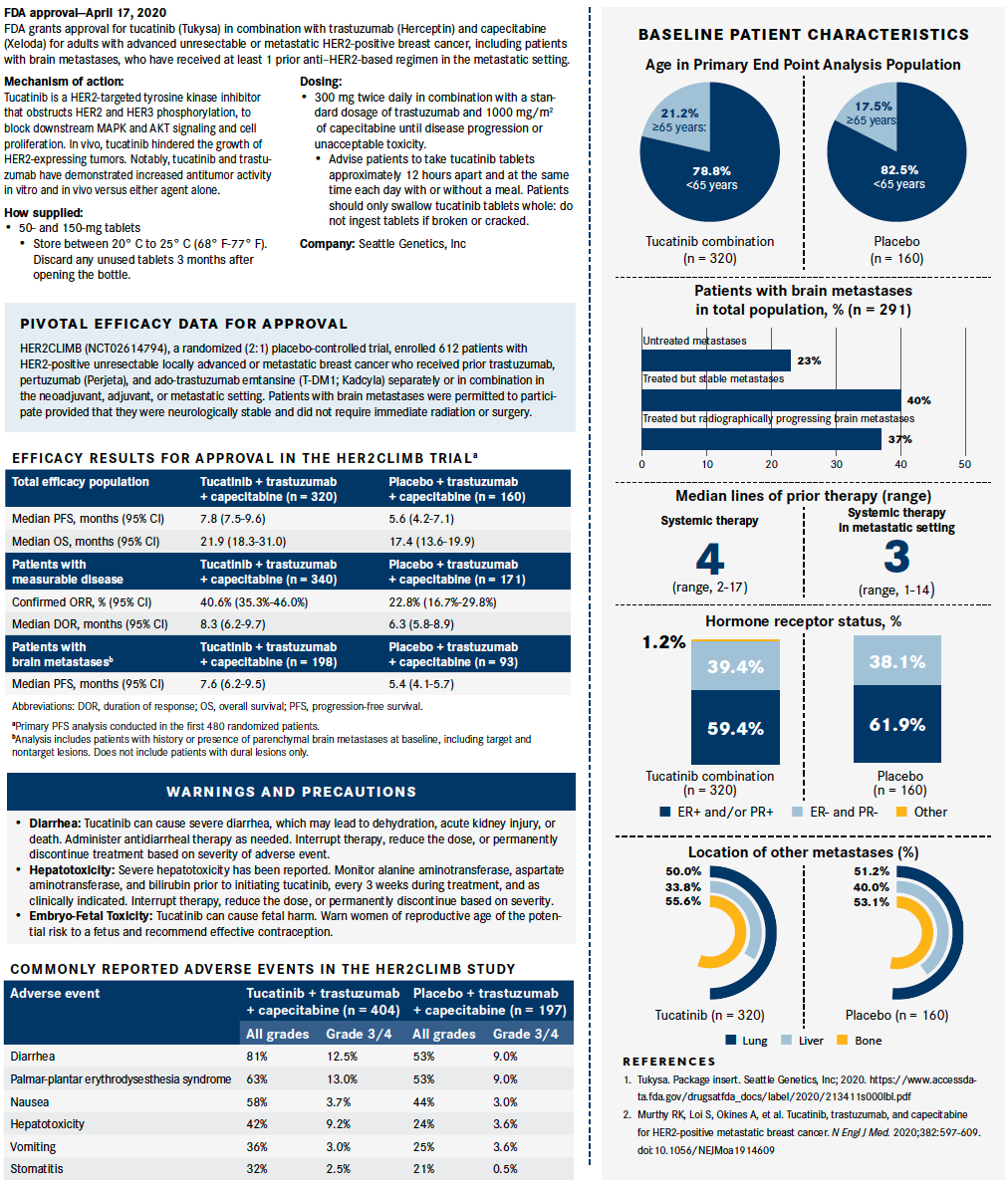Tucatinib Approval Adds Impact to HER2+ Breast Cancer Paradigm
Therapeutic options for pretreated HER2-positive breast cancer now include tucatinib (Tukysa) as part of a triplet regimen with a tolerable safety profile that promises improved quality of life.
Erika P. Hamilton, MD

Therapeutic options for pretreated HER2-positive breast cancer now include tucatinib (Tukysa) as part of a triplet regimen with a tolerable safety profile that promises improved quality of life.
On April 17, 2020, the FDA approved tucatinib in combination with trastuzumab (Herceptin) and capecitabine (Xeloda) for adults with advanced unresectable or metastatic HER2-positive breast cancer, including patients with brain metastases, who have received at least 1 prior anti–HER2-based regimen in the metastatic setting. Tucatinib is a HER2-directed tyrosine kinase inhibitor.
The approval is based on findings from the phase 2 HER2CLIMB study (NCT02614794), which demonstrated the triplet’s capacity to improve survival in patients with and without brain metastases. In the overall population, the median progression-free survival (PFS) with the 3-agent approach was 7.8 months versus 5.6 months with trastuzumab and capecitabine alone. Among those with brain metastases, median PFS was 7.6 months in the tucatinib arm versus 5.4 months in the control group.
In an interview with OncLive®, Erika P. Hamilton, MD, director of the Breast Cancer and Gynecologic Research Program at Sarah Cannon Research Institute in Nashville, Tennessee, discussed the regimen’s potential in earlier lines of therapy and how HER2CLIMB’s inclusion of patients with brain metastases has the power to move the needle in clinical investigations of therapies in this subgroup.
OncLive: What was noteworthy about the efficacy data?
Hamilton: HER2CLIMB had 4 end points looking at progression-free survival, overall survival, overall response rate, and then progression-free survival among patients with brain metastases. The trial met all 4 of these end points, so it was a win across the board.
The activity in the population of patients with brain metastases really stood out. We have a lot of good therapies for breast cancer, but many of them do not cross the blood-brain barrier, so patients with brain metastases comprise a very highrisk patient population that is known to have worse outcomes. To have a drug that not only [meets end points] across the board but also benefits patients with brain metastases is meaningful. There is a statistic from the trial that [shows] the progression-free survival at 1 year among patients with brain metastases was 0% if they were not receiving tucatinib [compared with] a quarter of patients with brain metastases who remained on the trial at 1 year and were [receiving tucatinib].
Why is HER2CLIMB’s inclusion of a broad population of patients with brain metastases important?
In oncology trials, we commonly allow patients with brain metastases only if they have been treated with local therapy, such as resection or radiation and are stable 4 weeks after they finish local treatment. This trial was very different. HER2CLIMB allowed 3 different populations of patients with brain metastases to enroll: this traditional population with stable, pretreated brain metastases; metastases that had never been treated; and metastases that were treated and had progressed after. It was a very high-risk population.
Right now, I think that there is a lot of talk about how important clinical trials are and many patients’ trouble accessing them. We know that the best treatment option for a patient is enrolling on a clinical trial. There is also a lot of talk about how our inclusion criteria are a little too [strict], maybe [stricter] than they need to be, and historically, there has been some fear from drug companies because they do not want to include patients who may be sicker, not have optimal organ function, or in this case, have actively progressing brain metastases and may not do as well on therapy.
I think it was progressive, wise, and brave to allow these patients on the trial, who probably stood to benefit the most. After this trial, because it is the first one to do so, I think there will be many more companies who will follow suit.
How well is the tucatinib triplet regimen tolerated?
We normally give HER2 therapy in conjunction with chemotherapy. Capecitabine is an oral chemotherapy that tends to be pretty well tolerated. It does not cause hair loss, and it also does not cause a patient’s [white blood cell] counts to drop [significantly], so it is a favored chemotherapy partner in breast cancer. Trastuzumab is our most widely used HER2 antibody, and we learned that having a dual HER2 blockade such as trastuzumab with pertuzumab [Perjeta] or in this case, trastuzumab and tucatinib, can [lead to] additive [efficacy]. It is a very good combination, and I think that what is unique about tucatinib is this [agent] does not add a whole lot of toxicity.
The most common adverse events we saw in the trial were diarrhea, hand-foot syndrome, nausea, and fatigue, and those are the most common side events of capecitabine as a single agent. The addition of tucatinib added some liver dysfunction, about a 5% grade 3 elevation in liver function tests that was reversible.
The most important [characteristic] of tucatinib that is unlike other HER2 [agents] that we are familiar with like lapatinib [Tykerb] and neratinib [Nerylnx] is that tucatinib is specific and only blocks HER2, which makes it better tolerated than some of our more traditional options for HER2-positive breast cancer. Lapatinib and neratinib not only block HER2, but they also block HER1, or EGFR, and toxicities of rash and diarrhea come from EGFR [inhibition].
What are the next steps for the use of this regimen?
Can we move tucatinib earlier [in the treatment paradigm]? There is a lot of excitement around the brain metastases data, but I do not see this as a drug that I would only use in patients with brain metastases because it is an active regimen for the 52% of patients on the trial who did not have brain metastases. Because our systemic therapies are effective for HER2-positive breast cancer, these women are living longer and longer. Up to 50% of people with this disease will eventually develop brain metastases, which is quite a bit higher than some other types of cancer, so using a drug like tucatinib, even in the absence of brain metastases—that can get into the brain and work—may prevent brain metastases. I think an important question to ask moving forward is if we use tucatinib earlier, could we prevent brain metastases?
I am currently enrolling [patients in] the HER2CLIMB-02 trial [NCT03975647] of tucatinib in combination with T-DM1 [Kadcyla; ado-trastuzumab emtansine] or T-DM1 alone in the second-line setting.





